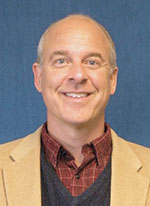Religious Education Supplement
Learn about the
unofficial religion
of North America
 Did you know that an unofficial religion has been declared in this part of our world?
Did you know that an unofficial religion has been declared in this part of our world?
As you read its three basic beliefs, keep in mind comments you’ve heard or conversations you’ve had with friends, neighbors, relatives, etc.
Do any of these ways of looking at life sound familiar to you?
“God? Sure, God exists. I don’t know that he’s all that interested in the details of my daily life, though.
“Pray? Well, sure, I pray. Like, when I need something, I sometimes pray to God for it.
“Isn’t the most important thing to be a nice person? I mean, just be a good person and everything will be OK. Heaven will be awesome.”
Few people would say that God does not exist, that they never pray or that being nice and good (notice the vagueness here) isn’t important to them. But for a lot of folks, that’s about as far as it goes.
This way of looking at the world, God and how we should treat each other has a name. While I encourage you not to focus too much on the words (as they are a bit abstract and academic-sounding) I’ll mention them briefly here so we can move on and discuss the substance of what they describe. The unofficial religion of North America is called moralistic therapeutic deism (MTD). (See related story)
It is deism because it acknowledges God, but sees him as not very involved with his creation.
It is therapeutic in that God is like the divine butler who helps us sometimes if we ask, but with whom we don’t often communicate in other ways (e.g., praise, gratitude, contrition).
It is moralistic because it says something about how we should behave—in a vague way that doesn’t do justice to the complexity of moral decision-making and the real harm that can come to people when immorality runs rampant.
Why should we care about MTD?
When a culture is dominated by a belief system like moralistic therapeutic deism (first described by sociologists Christian Smith and Melinda Lundquist), it’s important to be aware of its prominence for several reasons.
We can be vigilant so that our faith isn’t undermined by these path-of-least-resistance mindsets.
We can appreciate the struggle we have at times in sharing and teaching our faith.
We can be intentional and strategic in making clear the healthy correctives that our Christian faith provides:
God loves you and is very interested in every detail of your life—every moment of your day. “Even the hairs of your head have all been counted. Do not be afraid. You are worth more than many sparrows” (Lk 12:7).
God wants to hear all your thoughts and feelings—all your prayers—including your wants, needs and desires, but not limited to them.
God defines “nice” and “good” in a few specific ways because he loves us and knows best what will bring us happiness on Earth and eternal bliss, with him, in heaven.
As we celebrate another Catechetical Sunday on Sept. 9, let’s be mindful of the principalities, powers and world rulers of this present darkness (Eph 6:12). Let’s be aware of the unofficial religion of North America so that we can be faithful witnesses for Jesus Christ.
(Ken Ogorek is director of catechesis for the Archdiocese of Indianapolis.) †
 Did you know that an unofficial religion has been declared in this part of our world?
Did you know that an unofficial religion has been declared in this part of our world?